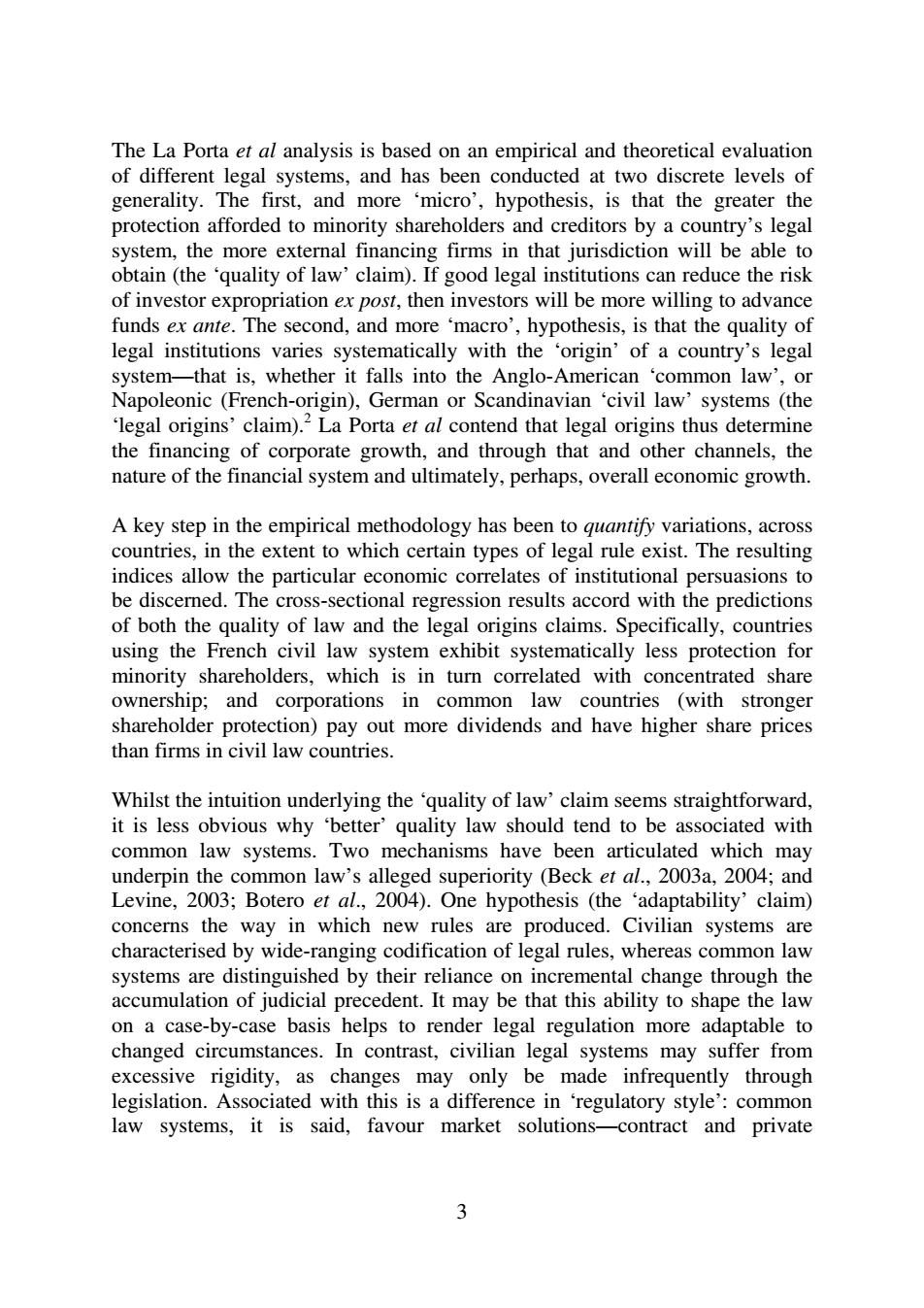正在加载图片...

The La Porta et al analysis is based on an empirical and theoretical evaluation of different legal systems,and has been conducted at two discrete levels of generality.The first,and more 'micro',hypothesis,is that the greater the protection afforded to minority shareholders and creditors by a country's legal system,the more external financing firms in that jurisdiction will be able to obtain (the 'quality of law'claim).If good legal institutions can reduce the risk of investor expropriation ex post,then investors will be more willing to advance funds ex ante.The second,and more 'macro',hypothesis,is that the quality of legal institutions varies systematically with the 'origin'of a country's legal system-that is,whether it falls into the Anglo-American common law',or Napoleonic (French-origin),German or Scandinavian 'civil law'systems (the 'legal origins'claim).La Porta et al contend that legal origins thus determine the financing of corporate growth,and through that and other channels,the nature of the financial system and ultimately,perhaps,overall economic growth. A key step in the empirical methodology has been to quantify variations,across countries,in the extent to which certain types of legal rule exist.The resulting indices allow the particular economic correlates of institutional persuasions to be discerned.The cross-sectional regression results accord with the predictions of both the quality of law and the legal origins claims.Specifically,countries using the French civil law system exhibit systematically less protection for minority shareholders,which is in turn correlated with concentrated share ownership;and corporations in common law countries (with stronger shareholder protection)pay out more dividends and have higher share prices than firms in civil law countries. Whilst the intuition underlying the quality of law'claim seems straightforward, it is less obvious why better'quality law should tend to be associated with common law systems.Two mechanisms have been articulated which may underpin the common law's alleged superiority (Beck et al.,2003a,2004;and Levine,2003;Botero et al.,2004).One hypothesis (the 'adaptability'claim) concerns the way in which new rules are produced.Civilian systems are characterised by wide-ranging codification of legal rules,whereas common law systems are distinguished by their reliance on incremental change through the accumulation of judicial precedent.It may be that this ability to shape the law on a case-by-case basis helps to render legal regulation more adaptable to changed circumstances.In contrast,civilian legal systems may suffer from excessive rigidity,as changes may only be made infrequently through legislation.Associated with this is a difference in 'regulatory style':common law systems,it is said,favour market solutions-contract and private 33 The La Porta et al analysis is based on an empirical and theoretical evaluation of different legal systems, and has been conducted at two discrete levels of generality. The first, and more ‘micro’, hypothesis, is that the greater the protection afforded to minority shareholders and creditors by a country’s legal system, the more external financing firms in that jurisdiction will be able to obtain (the ‘quality of law’ claim). If good legal institutions can reduce the risk of investor expropriation ex post, then investors will be more willing to advance funds ex ante. The second, and more ‘macro’, hypothesis, is that the quality of legal institutions varies systematically with the ‘origin’ of a country’s legal system—that is, whether it falls into the Anglo-American ‘common law’, or Napoleonic (French-origin), German or Scandinavian ‘civil law’ systems (the ‘legal origins’ claim).2 La Porta et al contend that legal origins thus determine the financing of corporate growth, and through that and other channels, the nature of the financial system and ultimately, perhaps, overall economic growth. A key step in the empirical methodology has been to quantify variations, across countries, in the extent to which certain types of legal rule exist. The resulting indices allow the particular economic correlates of institutional persuasions to be discerned. The cross-sectional regression results accord with the predictions of both the quality of law and the legal origins claims. Specifically, countries using the French civil law system exhibit systematically less protection for minority shareholders, which is in turn correlated with concentrated share ownership; and corporations in common law countries (with stronger shareholder protection) pay out more dividends and have higher share prices than firms in civil law countries. Whilst the intuition underlying the ‘quality of law’ claim seems straightforward, it is less obvious why ‘better’ quality law should tend to be associated with common law systems. Two mechanisms have been articulated which may underpin the common law’s alleged superiority (Beck et al., 2003a, 2004; and Levine, 2003; Botero et al., 2004). One hypothesis (the ‘adaptability’ claim) concerns the way in which new rules are produced. Civilian systems are characterised by wide-ranging codification of legal rules, whereas common law systems are distinguished by their reliance on incremental change through the accumulation of judicial precedent. It may be that this ability to shape the law on a case-by-case basis helps to render legal regulation more adaptable to changed circumstances. In contrast, civilian legal systems may suffer from excessive rigidity, as changes may only be made infrequently through legislation. Associated with this is a difference in ‘regulatory style’: common law systems, it is said, favour market solutions—contract and private